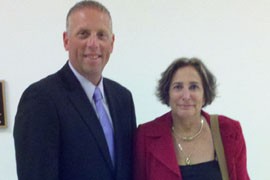Cronkite News has moved to a new home at cronkitenews.azpbs.org. Use this site to search archives from 2011 to May 2015. You can search the new site for current stories.
Arizona businesswoman asks Congress for certainty, clarity in estate tax
WASHINGTON – Phoenix accountant Thala Rolnick told a House committee Thursday that, whatever Congress does with the estate tax, it needs to make sure the law is clear and consistent so small-business owners can plan their estates.
“There can be no planning until we have permanence,” said Rolnick, noting that the tax has changed nine times since 1997 and the threshold for taxation has swung from $600,000 to $5 million.
She was one of several witnesses testifying at a hearing on the impact on small businesses of the so-called “death tax,” which currently applies to estates larger than $5 million but is set to revert next year to a $1 million threshold.
Witnesses complained that the tax is inconsistent from year to year, is too complicated and that the $1 million threshold, if allowed to take effect, would hit far too many businesses that could not afford it.
“If something happened to my dad, we’d have to sell the business,” because of the estate-tax burden, said Karen Madonia, the chief financial officer of an Illinois heating and air conditioning distribution company.
Rep. Joe Walsh, R-Ill., said he would rather do away with the estate tax entirely than “play that game” of trying different solutions to fix it. Most of his colleagues on the House Small Business Committee’s Subcommittee on Economic Growth, Tax and Capital Access agreed.
Many of the witnesses said that, if not eliminated, the tax should at least be kept at the higher $5 million threshold.
“If the estate tax reverts to the ($675,000) levels of 2000, my estate would be severely impacted,” said Michael Flesher, who owns a rental business in Vestal, N.Y., in testimony prepared for the hearing. “That could mean that 16 good people who have given our company many years of service would no longer have a job.”
Rep. Yvette Clarke, D-N.Y., asked if people with successful businesses in America felt an obligation to give back. The witnesses said they already do that by paying other taxes and by employing people.
“We want to be fair,” Clarke said. “We know you are the economic engines of our communities.”
For her part, Rolnick said she understands the need for the money raised by the estate tax – $69 billion in 2010, she said – and does not think too many businesses would be hurt if the threshold was dropped slightly, to no less than $3.5 million. That level would “exclude most small businesses,” she said.
But she and others said they need consistency and clarity as much as anything else. The constant changes about who is exempt and who is not make it hard to plan for the future, they said.
“Whatever Congress decides, stick with it,” said Neil Katz, a partner in a Syosset, N.Y., law firm that does taxes and estates.
Walsh asked why the tax is even needed, given the problems it causes people like the witnesses and the relatively small share of the federal budget it accounts for.
“The amount of money that the government raises on this tax is not a large amount,” he said. “But the headaches that we put people through to do it are amazing.”







